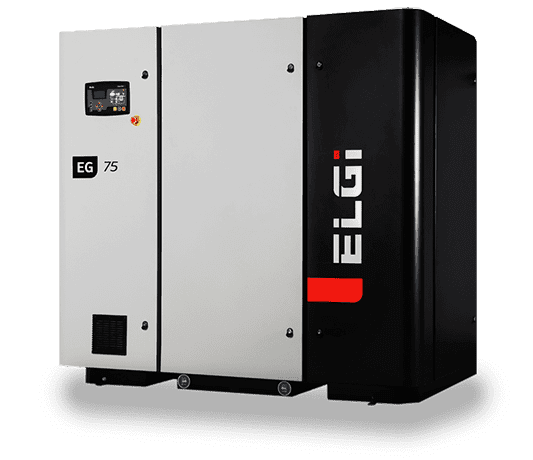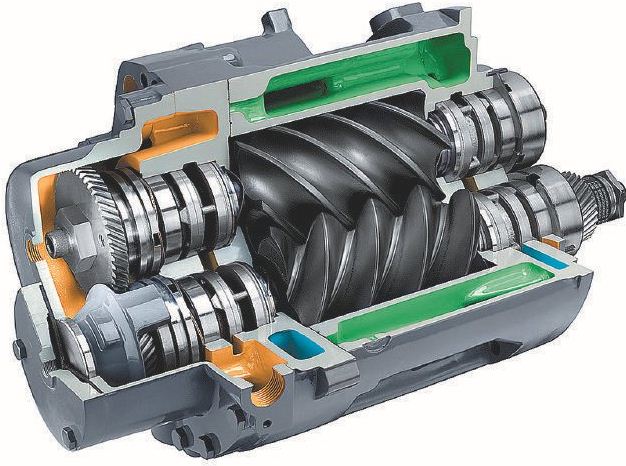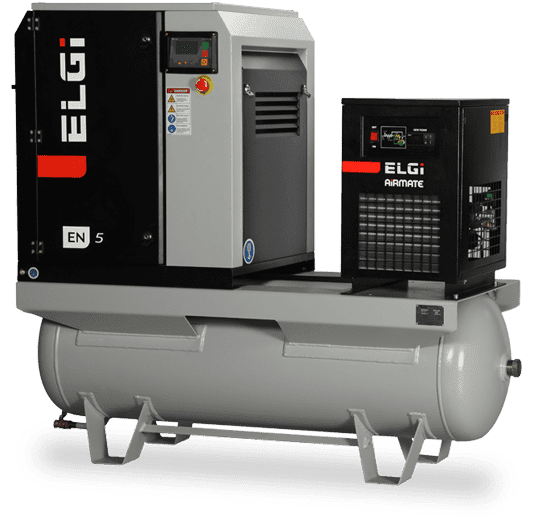Screw compressors are positive displacement machines that compress air using two interlocking helical rotors. They are known for their efficiency, reliability, and ability to provide a continuous supply of compressed air.
Screw compressors play a vital role in various industrial applications. Their design allows for smooth operation and minimal vibration, making them ideal for heavy-duty tasks. These compressors are often used in manufacturing, automotive, and HVAC systems. With a focus on energy efficiency, they can lower operational costs significantly.
Users appreciate their low maintenance requirements and long lifespan. As industries evolve, the demand for reliable air compression solutions continues to rise. Understanding screw compressors helps businesses choose the right equipment for their needs, ensuring optimal performance and productivity.

Credit: www.elgi.com
Introduction To Screw Compressor Air Efficiency
Screw compressors are vital in many industries. They provide compressed air for various applications. Efficiency in these compressors can lead to significant energy savings. Understanding their efficiency helps businesses optimize operations.
The Role Of Air Compressors In Industrial Operations
Air compressors are essential for industrial tasks. They convert power into potential energy stored in compressed air. This compressed air drives tools, machinery, and equipment. Key roles include:
- Powering pneumatic tools
- Operating production lines
- Supporting HVAC systems
- Facilitating material handling
Efficient air compressors reduce energy costs. They improve productivity and reliability. This is crucial for maintaining competitive operations.
Benefits Of High-efficiency Screw Compressors
High-efficiency screw compressors offer many advantages. Businesses can experience:
- Energy savings: Lower operational costs.
- Reduced downtime: Reliable performance and less maintenance.
- Consistent air supply: Stable pressure for equipment.
- Improved lifespan: Better design and technology.
Here is a table summarizing key benefits:
| Benefit | Description |
|---|---|
| Energy Efficiency | Lower energy consumption leads to cost savings. |
| Reliability | Less frequent breakdowns ensure continuous operation. |
| Noise Reduction | Quieter operation enhances workplace comfort. |
| Compact Design | Space-saving models fit in tight locations. |
Investing in high-efficiency screw compressors pays off. Enhanced performance and lower costs boost overall productivity.

Credit: www.air-compressor-guide.com
Key Features Of Screw Compressors
Screw compressors are essential for many industries. They offer reliable air compression. Understanding their key features helps users choose the right model. Below are the important aspects that define screw compressors.
Rotors And Compression Mechanism
The heart of a screw compressor is its rotors. These rotors are twin-screw mechanisms. They rotate in opposite directions. This rotation creates a vacuum that draws in air. The air is then compressed as it moves between the rotors.
Key benefits of the rotor design include:
- High Efficiency: Minimal energy loss during compression.
- Continuous Operation: Provides steady airflow without interruption.
- Low Noise Levels: Quieter than other compressor types.
The compression mechanism ensures:
- Reduced pulsations in airflow.
- Improved pressure stability.
Oil Injection And Cooling Systems
Oil injection is vital for screw compressors. It lubricates the moving parts. This reduces wear and tear. It also helps in cooling the compressed air.
Key aspects of oil injection and cooling systems include:
| Feature | Description |
|---|---|
| Cooling Efficiency | Maintains optimal operating temperatures. |
| Extended Lifespan | Reduces maintenance frequency and costs. |
| Oil Filtration | Removes contaminants for cleaner operation. |
These features enhance performance and reliability. Users benefit from lower operational costs.
Factors Affecting Screw Compressor Performance
Screw compressors are vital in many industries. Their performance directly impacts efficiency and costs. Understanding the factors that affect their performance helps in optimizing operations. Below are key areas to consider.
Operating Conditions Impact
Operating conditions play a crucial role in screw compressor performance. Several aspects influence how well these machines function:
- Temperature: High temperatures can reduce efficiency.
- Humidity: Excess moisture can cause corrosion.
- Altitude: Higher altitudes reduce air density.
- Load Variation: Fluctuating loads can lead to inefficiencies.
Monitoring these conditions helps maintain optimal performance. Regular assessments ensure that the compressor operates within the best parameters.
Maintenance And Upkeep Essentials
Proper maintenance is vital for screw compressor longevity. Neglecting maintenance can lead to poor performance. Here are essential maintenance tasks:
- Regular oil changes to ensure lubrication.
- Inspect and replace filters to keep air clean.
- Check belts and hoses for wear and tear.
- Monitor pressure levels regularly.
Implementing a maintenance schedule can prevent breakdowns. Consider using a checklist to track these tasks:
| Task | Frequency | Notes |
|---|---|---|
| Oil Change | Every 500 hours | Use manufacturer-recommended oil. |
| Filter Replacement | Every month | Check for clogs and debris. |
| Inspection | Weekly | Look for leaks or unusual noises. |
Adhering to these maintenance practices enhances performance. Regular upkeep minimizes downtime and maximizes efficiency.
Strategies To Enhance Efficiency
Enhancing efficiency in screw compressor air systems can reduce costs. It also improves performance and extends equipment lifespan. Focus on key strategies to achieve these goals.
Variable Speed Drives (vsd)
Variable Speed Drives (VSD) adjust the compressor’s speed. This helps match output to demand. VSDs offer several advantages:
- Energy savings: Reduces power consumption during low demand.
- Less wear: Minimizes mechanical stress on components.
- Improved control: Provides better pressure regulation.
Implementing VSD technology can lead to significant cost savings. It enhances system efficiency and responsiveness.
Proper Sizing And Selection
Correct sizing and selection of screw compressors are crucial. Oversized compressors waste energy. Undersized models struggle to meet demand. Follow these steps for proper sizing:
- Assess your air demand accurately.
- Consider peak and average usage rates.
- Choose a compressor that fits your specific needs.
Use the following table to understand sizing options:
| Compressor Size (CFM) | Typical Applications |
|---|---|
| 5-15 CFM | Small workshops, dental offices |
| 15-50 CFM | Automotive shops, light manufacturing |
| 50-100 CFM | Heavy manufacturing, food processing |
| 100+ CFM | Large industrial facilities |
Proper sizing and selection can maximize efficiency. It lowers operational costs and improves reliability.
Technological Advances In Air Compression
Air compression technology has seen significant improvements in recent years. These advances help industries optimize performance and reduce energy costs. Screw compressors lead this innovation, combining efficiency with reliability.
Innovations In Screw Compressor Design
Modern screw compressors feature various new designs. These designs enhance performance and lower energy consumption. Key innovations include:
- Variable Speed Drives: Adjust motor speed based on air demand.
- Advanced Materials: Use lightweight and durable components.
- Smart Controls: Implement IoT technology for real-time monitoring.
These innovations improve energy efficiency by up to 30%. Manufacturers can now produce quieter, more compact models. This leads to better integration into existing systems.
Energy Recovery Systems
Energy recovery systems play a crucial role in modern screw compressors. They capture waste heat from the compression process. This heat can be used for various applications, such as:
- Space heating
- Water heating
- Process heating
Implementing energy recovery can reduce energy costs significantly. It can recover up to 90% of the waste heat. This makes operations more sustainable and cost-effective.
Overall, technological advances in screw compressors lead to better efficiency and lower environmental impact. Industries benefit from these innovations through reduced operational costs and enhanced productivity.

Credit: www.elgi.com
Case Studies: Efficiency In Action
Screw compressors are revolutionizing industries worldwide. Their efficiency boosts performance and cuts costs. Let’s explore real-world examples where these compressors have transformed operations.
Real-world Examples Of Improved Operations
Many companies have adopted screw compressors. Here are some notable examples:
- Manufacturing Plant: A factory switched to a screw compressor. They reduced energy costs by 30%. Production increased by 20% within six months.
- Food Processing: A food plant upgraded its air system. The result? Consistent air pressure improved product quality. Waste decreased by 15%.
- Automotive Industry: An automotive manufacturer implemented a screw compressor. This change led to faster assembly times. They saved $100,000 in annual energy expenses.
Long-term Benefits And Roi
The benefits of screw compressors extend beyond immediate improvements. They offer significant long-term returns.
| Benefit | Description | Estimated ROI |
|---|---|---|
| Energy Savings | Lower energy consumption than traditional compressors. | Up to 40% over five years |
| Reduced Maintenance | Fewer moving parts lead to lower maintenance costs. | 20% savings annually |
| Increased Uptime | Reliable performance reduces downtime. | Cost savings of $50,000 per year |
Investing in screw compressors pays off over time. Companies enjoy lower costs and improved efficiency. Enhanced performance leads to happier customers.
Environmental Impact And Sustainability
The use of screw compressor air systems plays a vital role in sustainability. These systems provide efficient air compression while minimizing environmental harm. They help reduce energy consumption and lower emissions, supporting a healthier planet.
Reducing Carbon Footprint With Efficient Compressors
Screw compressors are designed for energy efficiency. This efficiency leads to significant reductions in carbon emissions.
- Energy savings: They consume less power compared to traditional compressors.
- Lower emissions: Reduced energy use results in lower greenhouse gas emissions.
- Improved performance: Enhanced designs lead to better air quality.
Using a screw compressor can cut energy costs. This promotes sustainability while benefiting the business.
Compliance With Environmental Regulations
Many industries face strict environmental regulations. Screw compressors help meet these standards effectively.
| Regulation | Impact of Screw Compressors |
|---|---|
| EPA Guidelines | Lower emissions help achieve compliance. |
| Energy Efficiency Standards | High efficiency meets or exceeds requirements. |
| Noise Regulations | Quieter operation reduces noise pollution. |
Choosing screw compressors helps companies align with regulations. This commitment fosters a greener future.
Conclusion And Future Outlook
The future of screw compressor air technology is bright. Continuous improvement drives efficiency and performance in various industries. This section explores the significance of ongoing advancements and future predictions.
The Importance Of Continuous Improvement
Continuous improvement is essential for screw compressors. It leads to:
- Enhanced energy efficiency
- Lower operational costs
- Extended equipment lifespan
- Reduced environmental impact
Companies must invest in research and development. This investment fosters innovation and keeps them competitive. Regular updates in technology allow for better performance and reliability. The focus on sustainability also shapes future improvements.
Predictions For Future Efficiency Innovations
Experts predict several key innovations in screw compressors:
- Integration of IoT technology for smart monitoring
- Development of advanced materials for durability
- Improved design for reduced noise levels
- Enhanced control systems for better efficiency
These innovations aim to:
| Innovation | Benefit |
|---|---|
| IoT Integration | Real-time performance tracking |
| Advanced Materials | Longer lifespan and less maintenance |
| Noise Reduction | Improved workplace comfort |
| Enhanced Control Systems | Optimized energy use |
These trends indicate a shift towards more efficient, eco-friendly solutions. Businesses can expect better performance and lower costs. The future of screw compressors looks promising and full of potential.
Frequently Asked Questions
What Is A Screw Compressor Air System?
A screw compressor air system utilizes two interlocking helical screws to compress air. This method is efficient and reliable for generating large volumes of compressed air. Industries prefer screw compressors for their durability and minimal maintenance requirements. They are ideal for continuous operation in various applications.
How Does A Screw Compressor Work?
A screw compressor works by drawing in air through an inlet valve. The two rotors then trap and compress the air as they turn. This process raises the air’s pressure and temperature. Finally, the compressed air is discharged through a cooling system for use in applications, ensuring efficiency.
What Are The Benefits Of Screw Compressors?
Screw compressors offer several advantages, including energy efficiency, low noise levels, and continuous operation. They require less maintenance compared to other types of compressors. Their compact design allows for easy installation in various settings. Additionally, they provide a steady air supply, making them suitable for industrial applications.
When To Use A Screw Compressor?
Use a screw compressor when you need continuous, high-volume compressed air. They are ideal for manufacturing processes, pneumatic tools, and air-driven machinery. If your application demands reliability and efficiency, a screw compressor is a suitable choice. It’s particularly beneficial in environments with constant air demand.
Conclusion
Screw compressor air systems offer efficiency and reliability for various applications. Their design ensures consistent performance, making them ideal for industrial use. Investing in a quality screw compressor can enhance productivity and reduce operational costs. Choose the right model to meet your specific needs and enjoy long-lasting benefits.

